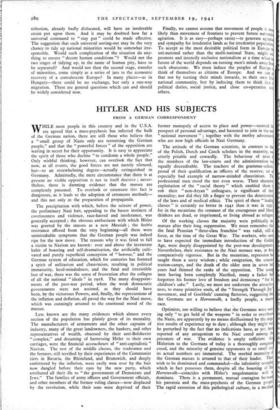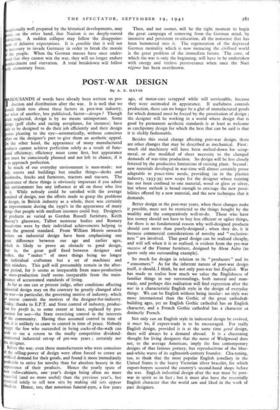HITLER AND HIS SUBJECTS
FROM A GERMAN CORRESPONDENT
WHILE most people in this country and in the U.S.A. are agreed that a mass-psychosis has infected the bulk of the German nation, there are still those who believe that a " small group of Nazis only are terrorising the German people," and that the " powerful forces " of the opposition are waiting in secret for their opportunity. It is easy to appreciate the spirit of those who decline " to condemn a whole people." Only wishful thinking, however, can overlook the fact that now, at all events, the good forces are not merely silenced, but—to an overwhelming degree—actually extinguished in Germany. Admittedly, the mere circumstance that there is at present no visible opposition is not in itself decisive ; never- theless, there is damning evidence that the masses are completely poisoned. To overlook or extenuate this fact is dangerous, as it leads to the adoption of erroneous methods— and this not only in the preparation of propaganda.
The precipitation with which, before the seizure of power, the preliminary Nazi bait, appealing to the basest instincts of covetousness and violence, race-hatred and intolerance, was generally accepted ; the obvious enthusiasm with which Hitler was greeted by the masses as a new Messiah ; the feeble resistance offered from the very beginning—all these were unmistakable symptoms that the German people was indeed ripe for the new move. The reasons why it was fated to fall a victim to Nazism are known: over and above the inveterate habit of boasting and self-dramatisation, the artificially culti- vated and purely superficial conception of honour," and the German system of education, which for centuries has fostered a spirit of militarism and chauvinism, resulting in political immaturity, herd-mindedness, and the fatal and irresistible lust of war, there was the sense of frustration after the collapse of all the national " ideals " in 1918. The many disappoint- ments of the post-war period, when the weak democratic governments were not assisted, as they should have been, by the victorious Powers, and, finally, the repercussions of the inflation and deflation, all, paved the way for the Nazi move, which was cunningly attuned to the emotional mood of the masses.
Less known are the many evidences which almost every section of the population has plainly given of its mentality. The manufacturers of armaments and the other captains of industry, many of the great landowners, the bankers, and other representatives of wealth, obsessed by their anti-Bolshevist " complex," and dreaming of harnessing Hitler to their own carriages, were the financial accoucheurs of " anti-capitalistic " Nazism. The rest of the middle classes, the tradesmen and the farmers, still terrified by their experiences of the Communist riots in Bavaria, the Rhineland, and Brunswick, and deeply embittered by the inflation, were easily won over by the bait now dangled before their eyes by the new .party, which attributed all their ills to " the government of Democrats and Jews." The families of army officers and Government officials, and other members of the former ruling classes—now displaced by the revolution, while their sons were deprived of their former monopoly of access to place and power—scented prospect of personal advantage, and hastened to join in the " national movement " ; together with the motley adventur, who are now high officials in Nazi Germany.
The attitude of the German scientists, in contrast to of the Polish, Dutch and Czech scholars in the majority, w utterly pitiable and cowardly. The behaviour of most the members of the law-courts and the administration s equally. discreditable. The teachers of the grammar-schoo proud of their qualification as 'officers of the reserve, set especially bad example of narrow-minded chauvinism. professional men stood the test even worse. Their shame] exploitation of the " racial theory " which enabled them rob their " non-Aryan " colleagues, is significant of mentality; nor did they lift a finger to prevent the deteriorati of the laws and of medical ethics. The spirit of these " lea classes " is certainly no better in 1941 than it was in 1932 for in the meantime the remnant of the courageous and libe thinkers are dead, or imprisoned, or living abroad as refugee Of the working classes the majority were politically mature after their long suppression. We must remember the fatal Prussian " three-class franchise " was valid, still force, at the time of the Great War. The .workers, who see to have expected the immediate introduction of the Golden Age, were deeply disappointed by the post-war development Nevertheless, their resistance to the Nazi menace was, at comparatively vigorous. But in the meantime, repression taught them a sorry wisdom ; while emigration, the concen- tration-camps, and the death of the older men in seven years had thinned the ranks of the opposition. The ,yo men having been completely Nazified, many a father had forgotten his former love of freedom and democracy " for Ian children's sake." Lastly, we must not underrate the attractis ness, to many primitive souls, of the " Strength Through Joy movement, and of Goebbels' cunning flatteries, suggesting t the Germans are a Herrenvolk, a lordly people, a mastel race.
Optimists, too willing to believe that the Germans were wait ing only " to get hold of the weapons " in order to overthr the Nazis, are apparently by no means disillusioned by the nega- tive results of experience up to date ; although they might be perturbed by the fact that no indications have, as yet, reported of any antagonism to the Nazi creed among prisoners of war. The evidence is amply sufficient Hitlerism to the Germans of today is a thoroughly conge creed, and the minority of genuine opponents is so small its actual numbers are immaterial. The morbid mentality the German masses is attuned to that of their leader. tie wish to be dominated and commanded—the inferiority complex which in fact possesses them, despite all the boasting of tha Herrenvolk—coincides with Hitler's megalomaniac will t° dominate. There is a permanent, mutual contagion berweell his paronoia and the mass-psychosis of the German people The rapid extension of this pathological culture, in a medium miceptionally well prepared by the historical developments, may rove, on the other hand, that Nazism is no deeply-rooted nviction. A sudden collapse may follow the disappoint- ment of delusive expectations. It is possible that it will not necessary to invade Germany in order to break the morale the people. When the German masses have once under- tood that they cannot win the war, they will no longer endure mbardment and starvation. A total breakdown will follow kith elementary force. Then, and not sooner, will be the right moment to begin the great campaign of removing from the German mind, by intensive and persistent re-education, all the nonsense that has been hammered into it. The regeneration of the depraved German mentality which is now menacing the civilised world is the great problem of the immediate future. The cure, of which the war is only the beginning, will have to be undertaken with energy and tireless perseverance when once the Nazi regime has been overthrown.



























 Previous page
Previous page